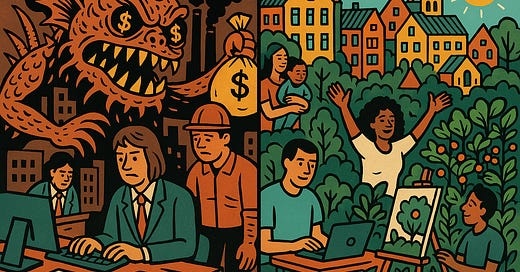It’s Not About Greed. It’s About Design.
What if corporations aren’t greedy—they’re just unregulated animals in the ecosystem?
Not evil. Not broken. Just doing what they were designed to do.
A lion isn’t morally bad for hunting prey. It’s doing what it’s built to do.
Same with corporations. They’re built to pursue growth. Profit. Survival.
They will extract, expand, and devour until something stops them—not because they’re evil, but because they’re functioning exactly as designed.
So the question isn’t why are corporations so greedy?
The question is: Why did we build a system with no balancing force, no accountability, and no consequences when harm is done?
I. Stop Moralizing. Start Observing.
Let’s take the morality out of it. Greed isn’t a sin here. It’s a function.
We’ve spent decades arguing about whether corporations are “good” or “bad,” whether billionaires are “evil” or “earned it.”
But that misses the point. It’s not about personal virtue. It’s about structure.
If a system rewards extraction, then extraction will flourish.
If a system rewards reinvestment, then contribution will flourish.
It’s not a moral flaw. It’s a design flaw—or a design choice.
It’s not up to corporations to function altruistically. They aren’t built that way.
It’s up to us to decide what we value—and what we’re willing to be squeezed for.
II. Language Shapes Imagination
We also need new language.
When people say “working class,” it often conjures factory floors, hard hats, unions.
But what about office workers? Freelance creatives? Healthcare aides? Teachers? Caregivers? Coders? Delivery drivers?
They’re working. They’re producing. They’re exhausted.
But they don’t see themselves in that phrase. So they tune out.
Maybe it’s not “working class” anymore. Maybe it’s:
The builder class
The functioners
The middle-tier majority
The laboring middle
The hustle economy
The human engine
We need language that reflects how people are working today—digitally, emotionally, creatively—not just industrially.
Because if we can’t name ourselves in the system, we can’t fight for change.
And if the words are outdated, the solutions will be too.
III. Start Points, Not Talking Points
A core myth in American capitalism is that we all start from zero.
That the game is fair. That if you succeed, it’s because you worked harder.
And if you struggle, it’s because you didn’t.
But not everyone starts from the same place.
Some inherit wealth. Others inherit trauma.
Some grow up surrounded by possibility. Others grow up surrounded by survival.
Some are told “you can be anything.” Others are told “you’ll be lucky to survive.”
Work ethic isn’t the only thing passed down.
So is belief.
So is safety.
So is emotional bandwidth.
So is access to opportunity and imagination.
If we want to build a system rooted in fairness, we have to start by asking:
Are we okay with different starting points?
If yes, how do we ensure that the gap doesn’t harden into a caste system?
If no, are we willing to disrupt generational transfer—not just of money, but of opportunity, access, and inherited ease?
These are cultural questions, not just policy debates.
IV. 1776 Was About Freedom. But Freedom Matures.
In 1776, Adam Smith published The Wealth of Nations while America declared independence.
Both events were driven by a desire for freedom—from monarchy, from mercantilism, from state control.
The goal was simple: put the future back in the hands of individuals, not kings.
Less government. More possibility.
But what happens when freedom becomes dogma?
When “freedom” is used to justify deregulation, hoarding, and abandonment of care?
We never reconciled freedom with fairness.
We never stopped to say: Is this still working?
We never matured beyond the idea of liberty into the practice of responsibility.
Do we want to regress into a childlike, oversimplified version of America?
Or do we want to reclaim the spirit of 1776—but update it with the maturity of lived experience?
Freedom without structure isn’t justice.
It’s chaos for the vulnerable and consolidation for the powerful.
V. What Comes Next Has to Come From Us
Corporations won’t fix this. They’re not designed to.
Politicians won’t fix this. Not without pressure.
It has to come from us.
From a cultural decision about what kind of people we want to be.
From a willingness to name shared values—clearly, loudly, and together.
Do we value fairness?
Opportunity?
Kindness?
Safety?
Dignity?
Then we need systems that reflect those values—not just slogans that perform them.
Before we argue over socialism vs. capitalism, we need to ask:
What kind of life do we believe people deserve?
And what kind of structures would best support that?
You can’t design a better future using the blueprint of a past you haven’t questioned.
And you can’t build equity on a foundation of euphemism.
We need new words.
New metaphors.
New agreements.
Because when language evolves, imagination expands.
And when imagination expands, systems begin to shift.
So let’s start there.
Not with party lines or policy platforms.
But with shared human truths:
We want to be safe.
We want to be free.
We want our work to matter.
We want our children to thrive.
We want our country to reflect the best of us—not just the wealthiest or the loudest.
The system should serve those goals—not the other way around.



